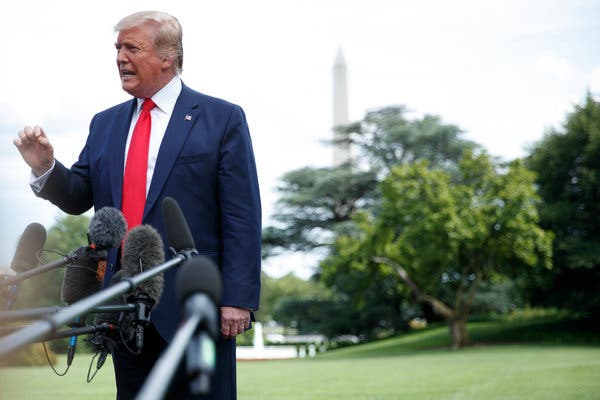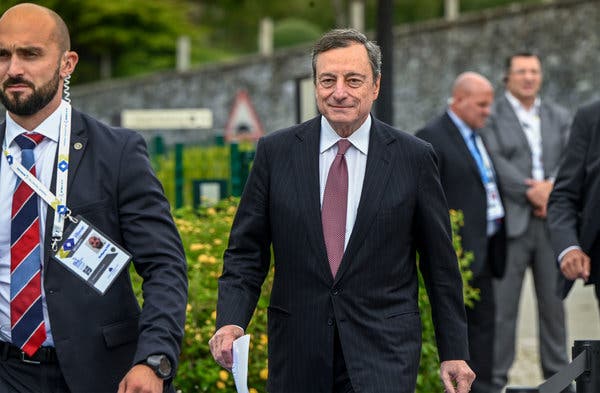Advertisement

WASHINGTON — To President Trump, economics has always been a zero-sum game: If another country is winning, the United States must be losing.
That view became clear on Tuesday, when Mr. Trump accused the European Central Bank of trying to prop up Europe’s economy and weaken its currency to gain a competitive edge over the United States.
Mr. Trump directed his criticism at Mario Draghi, the bank’s president, who said in a speech on Tuesday that “additional stimulus will be required” to help Europe withstand the economic challenges it faced, including mounting protectionist threats stemming from Mr. Trump’s trade war.
Those comments caused European financial markets to rally and the euro to decline sharply against the dollar.
Mr. Trump, in a series of tweets, accused Mr. Draghi of deliberately pushing down the value of the euro “making it unfairly easier for them to compete against the USA.”
“They have been getting away with this for years, along with China and others,” he tweeted.
Speaking to reporters at the White House later in the day, Mr. Trump said Mr. Draghi “did something today that was very dramatic. And, frankly, it helped that part of the world.”
Mr. Trump is viewing international economic policies through an increasingly narrow lens, observing only how decisions will affect the United States and seeing other countries’ attempts to help their economies as working against America’s interests. He has continually accused the Federal Reserve of putting the United States at a disadvantage to China, Europe and others by raising interest rates and has urged the central bank to take steps to strengthen the American economy, including cutting rates and restarting crisis-era stimulus programs.
On Tuesday afternoon, Mr. Trump suggested that he would consider demoting the Fed’s chairman, Jerome H. Powell, if the United States central bank did not also move toward easing policy. The Fed is expected to leave rates unchanged on Wednesday after a two-day policy meeting. But many economists expect Fed officials to signal that they are willing to cut rates soon if a slowing global economy and escalating trade tensions threaten the outlook for United States growth.
“We’ll see what happens; they’re going to be making an announcement pretty soon, so we’ll see what happens,” Mr. Trump said, when asked whether he would take the unprecedented step of trying to strip Mr. Powell of his chairmanship. “I want to be given a level playing field, and so far I haven’t been.”
Only a few months ago, central banks were putting the brakes on their fast-growing economies or, in the European Central Bank’s case, unwinding emergency measures put in place during the last crisis. But now the people who manage monetary policy are reversing direction in the face of new threats to growth, including Mr. Trump’s trade war, escalating tension between the United States and Iran and rising fears of recession.
Mr. Trump’s trade fights have escalated in recent weeks, magnifying the risk of a slowdown. He threatened tariffs on Mexican goods before calling them off and gave Japan and Europe six months to reach a trade agreement with the United States or face auto tariffs. After trade talks with China collapsed, Mr. Trump increased tariffs on $200 billion of Chinese goods and said he would tax an additional $300 billion worth if he and Chinese President Xi Jinping could not reach a deal. The two leaders are set to talk at a Group of 20 meeting later this month.
The effects of Mr. Trump’s trade war have hurt the European Union, particularly Germany, its largest economy. Trade anxiety has led to a decline in business sentiment and spending: Overall German industrial production contracted sharply in April, falling 1.9 percent on the month versus the 0.5 percent analysts expected.
Global growth stands to benefit if the European Central Bank’s promises avert a more severe slowdown, and the United States itself stands to gain if Mr. Draghi’s actions prevent broader economic pain across trading partners. But to a president who views globalization as a negative, those links are seen more as ways to hurt, not help, the United States.
For instance, Mr. Trump has begun equating currency movements with monetary policy. Currencies do move in response to central banks’ interest rate decisions, but that is generally not policymakers’ explicit goal. Officials target measures of economic growth, not the cost of the euro or dollar.
The president has fixated on what the euro and Chinese yuan are doing relative to the United States dollar — and how monetary policy at home and abroad fits in. He tweeted about the lack of a level playing field last year, and his trade adviser, Peter Navarro, has marshaled similar attacks on Germany for currency manipulation.

Viewing the European Central Bank’s posturing only in terms of how it will affect the value of the euro relative to the dollar overlooks monetary policy’s broader advantages.
The Fed and other global central banks guide their domestic economies by moving short-term interest rates and by buying bonds. Doing that without an eye toward exchange rate manipulation is critical in a globalized economy with free-floating currencies. It allows major nations to keep economic activity operating at an even keel, without resulting in tit-for-tat currency battles that become a race to the bottom and risk ignoring other monetary policy goals, like controlling inflation.
For his part, Mr. Draghi denied that he was trying to give European companies an unfair advantage.
“We don’t target the exchange rate,” Mr. Draghi said, to applause from the economists and central bankers gathered at a golf resort in Sintra, Portugal, for the European Central Bank’s annual Forum on Central Banking.
Larry Kudlow, director of the National Economic Council, said he agreed with Mr. Trump’s concerns.
“He’s concerned that there is some certain beggar-thy-neighbor policies in the currency market,” he said Tuesday. “It sure would be better to have currency stability it seems to me rather than manipulating either for trade reasons or other macro reasons.”
The eurozone has been on the receiving end of Mr. Trump’s steel and aluminum tariffs, and its companies have also been caught in the cross-fire as the Trump administration ramps up tensions with China. Trade-sensitive factory gauges are weakening, particularly in Germany, and the president has threatened auto tariffs that would hurt German carmakers, casting a persistent dark cloud over the outlook.
Mr. Draghi had signaled earlier this month that the European Central Bank was becoming increasingly willing to revive stimulus measures used to combat a debt crisis that began in 2010. But in a panel discussion at the central banking forum Tuesday, he made it clear that his statements during a speech earlier in the day signaled a significant shift in response to a climate of pervasive economic uncertainty.
Mr. Draghi had previously indicated that the central bank would act if the economic situation worsened, but the reverse is now true: The central bank will act unless the situation gets better.
“This is exactly because of that lingering uncertainty that by itself is a materialization of risk,” Mr. Draghi said.
Mr. Draghi’s eight-year term will end in October, and later this week European leaders will meet in Brussels to discuss choosing his successor.
By effectively committing the central bank to action as soon as its next monetary policy meeting, on July 25, Mr. Draghi may have been reassuring financial markets that economic stimulus will linger long after he leaves office.
His words could be seen as a kind of pre-emptive strike in case his successor turns out to be a conservative like Jens Weidmann, a member of the Governing Council from Germany who is considered a leading candidate. Mr. Weidmann, who was in the audience Tuesday, is seen as being less willing to aggressively combat a slowdown.
In December, the European Central Bank stopped adding to its stock of government and corporate bonds, which it had bought in large quantities to push down market interest rates. But in March, as Mr. Trump’s trade war disrupted the global economy, officials showed signs of having second thoughts, and revived a program intended to encourage banks to lend more to businesses and consumers as a means to prevent a recession.
Mr. Draghi suggested Tuesday that the bank is ready to go much further, including adding to the 2.6 trillion euros, or $2.9 trillion, in government and corporate bonds that were acquired over several years as part of the so-called quantitative easing program. The bond buying is a form of money printing because the central bank makes the purchases with newly created euros.
The central bank’s benchmark interest rate is already zero, and cannot go any lower. However, Mr. Draghi said the bank could increase the so-called negative interest rate on commercial banks’ deposits at the central bank. The rate is currently minus 0.4 percent, and amounts to a penalty on the deposits and a way of nudging banks to put the money to work in the economy.
The Fed has not signaled it is prepared to go nearly as far as Europe might. Growth in the United States has moderated somewhat, but the economy remains strong. Mr. Powell indicated early this year that the Fed was pivoting away from steadily lifting interest rates, adopting a patient stance instead as markets wobbled and growth showed signs of weakening.
“We do not know how or when these issues will be resolved,” Mr. Powell said of trade spats, speaking earlier this month. “As always, we will act as appropriate to sustain the expansion.”
Jack Ewing reported from Sintra, Portugal.
A version of this article appears in print on , on Page A1 of the New York edition with the headline: Europe Unfair To the Dollar, President Says. Order Reprints | Today’s Paper | Subscribe
